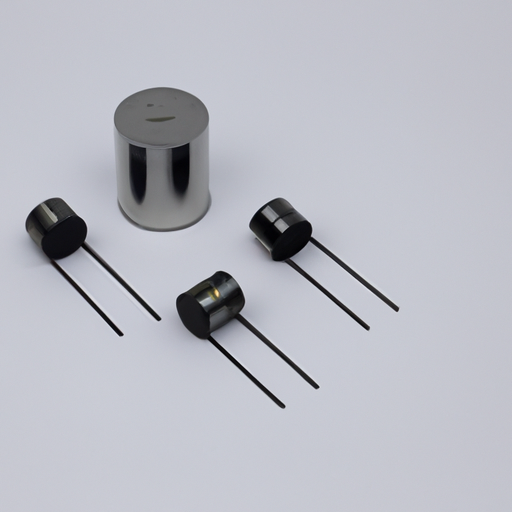Core Functional Technologies of Thin Film Capacitors
1. High Dielectric Constant Materials: Thin film capacitors utilize materials with high dielectric constants, such as tantalum pentoxide (Ta2O5) or barium titanate (BaTiO3). This allows for a reduction in physical size while maintaining or increasing capacitance values, which is essential for compact electronic designs.

2. Low Equivalent Series Resistance (ESR): The low ESR characteristic of thin film capacitors is crucial for applications requiring high-frequency operation. This property minimizes energy losses, enhances efficiency, and improves the overall performance of electronic circuits, particularly in RF applications.
3. Temperature Stability: Thin film capacitors are engineered to exhibit stable capacitance across a wide temperature range. This stability is vital for applications in environments with fluctuating temperatures, ensuring reliable performance in critical systems.
4. High Voltage Ratings: The thin film technology enables the production of capacitors that can withstand high voltage levels, making them suitable for power electronics, RF applications, and other high-voltage environments.
5. Integration with Other Technologies: Thin film capacitors can be integrated with other thin film components, such as resistors and inductors, to create compact, multifunctional modules. This integration is particularly beneficial in applications where space is at a premium.
Application Development Cases
1. RF and Microwave Applications: Thin film capacitors are essential in RF and microwave circuits, where their low ESR and high-frequency capabilities are critical. They are commonly used in tuning circuits, filters, and impedance matching networks, contributing to improved signal quality and performance.
2. Power Electronics: In power supply circuits, thin film capacitors serve as decoupling and filtering components. Their ability to handle high voltages and currents makes them ideal for applications in DC-DC converters, inverters, and power management systems, enhancing efficiency and reliability.
3. Consumer Electronics: In modern devices such as smartphones, tablets, and wearables, thin film capacitors are integral to power management systems. They help optimize energy use, reduce component size, and improve overall device performance, contributing to the trend of miniaturization in consumer electronics.
4. Automotive Applications: With the increasing adoption of electric vehicles (EVs), thin film capacitors are being utilized in battery management systems and electric drive systems. Their reliability and performance under varying temperature conditions make them suitable for automotive applications, where safety and efficiency are paramount.
5. Medical Devices: In the medical field, thin film capacitors are used in critical applications such as pacemakers, diagnostic equipment, and imaging systems. Their precision, reliability, and ability to operate in harsh environments are essential for ensuring patient safety and device performance.
6. Telecommunications: In telecommunications infrastructure, thin film capacitors are employed in signal processing and filtering applications. Their high-frequency performance is crucial for maintaining signal integrity in communication systems, contributing to the efficiency and reliability of data transmission.
Conclusion
Thin film capacitors represent a significant advancement in capacitor technology, offering high performance, miniaturization, and integration capabilities. Their applications span various industries, including telecommunications, automotive, consumer electronics, and medical devices. As technology continues to evolve, the demand for thin film capacitors is expected to grow, driving further innovation and development in this field.
Further Reading and Resources
For those interested in exploring more about thin film capacitors, consider the following resources:
| Academic Journals: Look for articles in journals such as the *Journal of Applied Physics* or *IEEE Transactions on Electron Devices* for in-depth studies on thin film capacitor technology.Academic Journals: Look for articles in journals such as the *Journal of Applied Physics* or *IEEE Transactions on Electron Devices* for in-depth studies on thin film capacitor technology. |
| Industry Publications: Magazines like *EDN* and *Electronics Weekly* often feature articles on the latest advancements in capacitor technology and applications.Industry Publications: Magazines like *EDN* and *Electronics Weekly* often feature articles on the latest advancements in capacitor technology and applications. |
- Technical White Papers: Manufacturers of thin film capacitors often publish white papers detailing their products' specifications, applications, and case studies, which can provide valuable insights into real-world applications.
- Conferences and Workshops: Attending industry conferences such as the *International Symposium on Power Semiconductor Devices and ICs (ISPSD)* can provide networking opportunities and insights into the latest research and developments in thin film capacitor technology.
Core Functional Technologies of Thin Film Capacitors
1. High Dielectric Constant Materials: Thin film capacitors utilize materials with high dielectric constants, such as tantalum pentoxide (Ta2O5) or barium titanate (BaTiO3). This allows for a reduction in physical size while maintaining or increasing capacitance values, which is essential for compact electronic designs.

2. Low Equivalent Series Resistance (ESR): The low ESR characteristic of thin film capacitors is crucial for applications requiring high-frequency operation. This property minimizes energy losses, enhances efficiency, and improves the overall performance of electronic circuits, particularly in RF applications.
3. Temperature Stability: Thin film capacitors are engineered to exhibit stable capacitance across a wide temperature range. This stability is vital for applications in environments with fluctuating temperatures, ensuring reliable performance in critical systems.
4. High Voltage Ratings: The thin film technology enables the production of capacitors that can withstand high voltage levels, making them suitable for power electronics, RF applications, and other high-voltage environments.
5. Integration with Other Technologies: Thin film capacitors can be integrated with other thin film components, such as resistors and inductors, to create compact, multifunctional modules. This integration is particularly beneficial in applications where space is at a premium.
Application Development Cases
1. RF and Microwave Applications: Thin film capacitors are essential in RF and microwave circuits, where their low ESR and high-frequency capabilities are critical. They are commonly used in tuning circuits, filters, and impedance matching networks, contributing to improved signal quality and performance.
2. Power Electronics: In power supply circuits, thin film capacitors serve as decoupling and filtering components. Their ability to handle high voltages and currents makes them ideal for applications in DC-DC converters, inverters, and power management systems, enhancing efficiency and reliability.
3. Consumer Electronics: In modern devices such as smartphones, tablets, and wearables, thin film capacitors are integral to power management systems. They help optimize energy use, reduce component size, and improve overall device performance, contributing to the trend of miniaturization in consumer electronics.
4. Automotive Applications: With the increasing adoption of electric vehicles (EVs), thin film capacitors are being utilized in battery management systems and electric drive systems. Their reliability and performance under varying temperature conditions make them suitable for automotive applications, where safety and efficiency are paramount.
5. Medical Devices: In the medical field, thin film capacitors are used in critical applications such as pacemakers, diagnostic equipment, and imaging systems. Their precision, reliability, and ability to operate in harsh environments are essential for ensuring patient safety and device performance.
6. Telecommunications: In telecommunications infrastructure, thin film capacitors are employed in signal processing and filtering applications. Their high-frequency performance is crucial for maintaining signal integrity in communication systems, contributing to the efficiency and reliability of data transmission.
Conclusion
Thin film capacitors represent a significant advancement in capacitor technology, offering high performance, miniaturization, and integration capabilities. Their applications span various industries, including telecommunications, automotive, consumer electronics, and medical devices. As technology continues to evolve, the demand for thin film capacitors is expected to grow, driving further innovation and development in this field.
Further Reading and Resources
For those interested in exploring more about thin film capacitors, consider the following resources:
| Academic Journals: Look for articles in journals such as the *Journal of Applied Physics* or *IEEE Transactions on Electron Devices* for in-depth studies on thin film capacitor technology.Academic Journals: Look for articles in journals such as the *Journal of Applied Physics* or *IEEE Transactions on Electron Devices* for in-depth studies on thin film capacitor technology. |
| Industry Publications: Magazines like *EDN* and *Electronics Weekly* often feature articles on the latest advancements in capacitor technology and applications.Industry Publications: Magazines like *EDN* and *Electronics Weekly* often feature articles on the latest advancements in capacitor technology and applications. |
- Technical White Papers: Manufacturers of thin film capacitors often publish white papers detailing their products' specifications, applications, and case studies, which can provide valuable insights into real-world applications.
- Conferences and Workshops: Attending industry conferences such as the *International Symposium on Power Semiconductor Devices and ICs (ISPSD)* can provide networking opportunities and insights into the latest research and developments in thin film capacitor technology.









